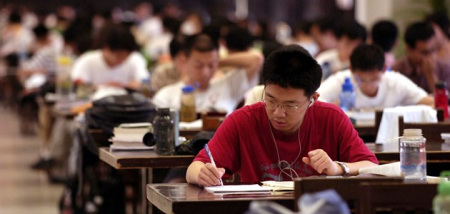|
|
外媒:中国名牌大学农村学生越来越少 中国名牌大学农村学生越来越少
As China tries to graduate from the world's factory to a nation with a strong middle class, its peasants still aren't ready to make the leap. According to official statistics, China's urban-rural income gap reached 3.33:1 in 2009, the widest since 1978, if not before. And as the gap increases, poor peasants are becoming marginalized in higher education, closing off one of their best opportunities for advancement. The trend is particularly alarming in Tsinghua and Peking universities, known as China's MIT and Harvard respectively for their places atop China's academic totem pole。 The most recent statistics published by media showed that of China's top two schools, Peking University had a rural population of 16.3 percent in 1999 (down from 50 percent to 60 percent in the 1950s), while Tsinghua University had a rural population of 17.6 percent in 2000. A professor at PKU said that the number might be as low as 1 percent - a shocking statistic considering that more than half of China's population is rural. "We can hardly find anyone here with a rural household registration," he said。 Across China, peasants make up 56 percent of the college-age population but only 50 percent of university students, mostly concentrated in China's less prestigious universities. Yet the very top schools are the most skewed toward city residents. Why can't peasants make it into elite universities? "Every rural area in China, including the outskirts of Beijing, lacks the educational resources of urban areas," says Liu Hong, executive director of Peer China, a nonprofit organization that focuses on bringing educational equality to Chinese secondary schools。 Traditionally, entrance to a university depended solely on an applicant's score on a standardized test, called the Gaokao (national college entrance ex?aminations). But over the last five years or so, "China went into a different system that relied less on the Gaokao and started to allow for more monkeying with the system," says James Z. Lee, dean of humanities and social science at the Hong Kong University of Science and Technology. Chinese schools are copying Western ones that consider applicants in a more holistic way as they try to nurture well-rounded individuals instead of ace test takers. Yet, Liu says, "focusing on individuals widens the gap between urban and rural, because teachers in rural areas" can't offer their students nearly as well-rounded an education as their urban counterparts can。 The problems with peasant education are manifest. Farming villages aren't great places to live, so they have a tough time attracting good teachers. What's more, as wages continue to rise, the opportunity cost for peasants to leave high school and enter the work force skyrockets. Good high schools can cost $3,000 for three years, and a high-school-age laborer can earn $150 a month。 China's education system, where peasants can get a rudimentary education before populating thousands of factories along its eastern coast, suited it when the country sought to be the world's sweatshop. Yet factory jobs will continue to migrate to places like India. Wages in China will continue to rise. And as long as China finds no better way to educate its rural poor, it's staring down a future with a 100 million-strong underclass。 美国《新闻周刊》网站8月21日文章:从生活的艰辛中学习 在中国努力“从世界工厂毕业”、成为拥有强大中产阶级的国家之时,该国农村人口仍未做好实现这一跨越的准备。据官方统计数据,2009年中国城镇与农村的收入之比达到了3.33比1,这是1978年以来的最大差距。随着收入差距不断扩大,贫穷的农村人口在高等教育方面正被边缘化,这使得他们丧失了提高自身的最佳机会。在清华大学和北京大学这两所在中国学术界享有至高无上地位、分别号称中国的麻省理工和哈佛的高校,这一趋势尤为令人担忧。 中国媒体最近一次公布的数据表明,北京大学1999年的农村学生比例为16.3%(这一比例在上世纪50年代为50%——60%),而清华大学2000年农村学生占17.6%。北京大学一位教授称,现在的比例可能仅为1%。这一数字令人震惊,因为中国有半数多人口是农村人口。他说:“我们这里几乎找不到农村户口的学生。” 在中国,农村人口在达到大学入学年龄的人口中占56%,但在大学生总数中仅占50%,而且大多集中在知名度不高的大学。但知名高校最青睐城市学生。为什么农村学生不能进入名牌高校?专门致力于推动中国中学教育平等的非营利性机构中国挚友计划负责人刘泓说:“包括北京郊区在内的所有中国农村地区都缺乏城镇地区享有的教育资源。” 一直以来,能否进入大学仅仅取决于申请者的高考成绩。然而,香港科技大学人文与社会科学院院长李中清说,在近些年,“中国迈入了一种与以往不同的体制,新体制对高考的依赖程度降低并开始允许更多‘胡闹’行为”。中国高校正在效仿西方,西方高校会对申请者进行更为全面的考量,因为他们的目标是培养全面发展的人才而非考试能手。然而,刘泓说,对个人素质的重视加大了城乡差距,因为农村地区的教师无法像城镇教师那样为学生提供一种近乎全面的教育。 农村教育存在的问题显而易见。农村不是适合生活的好地方,因此很难吸引优秀教师。此外,工资上涨,农村孩子继续读高中的机会成本相应增加。一所好的高中三年学费就要三千美元,而达到高中生年龄的劳动力每月能赚150美元。 在中国的教育体制下,农村人口在进入东部沿海地区的数千家工厂之前能够接受基础教育。在中国过去努力成为世界的血汗工厂时,这种体制十分适合。但工厂的就业岗位将继续向印度等地转移,中国劳动力的工资将继续上涨。如果中国找不到教育农村人口的更好方式,那么该国的未来将不甚乐观。 网友评论
企业服务 |
||||||||||||||||



